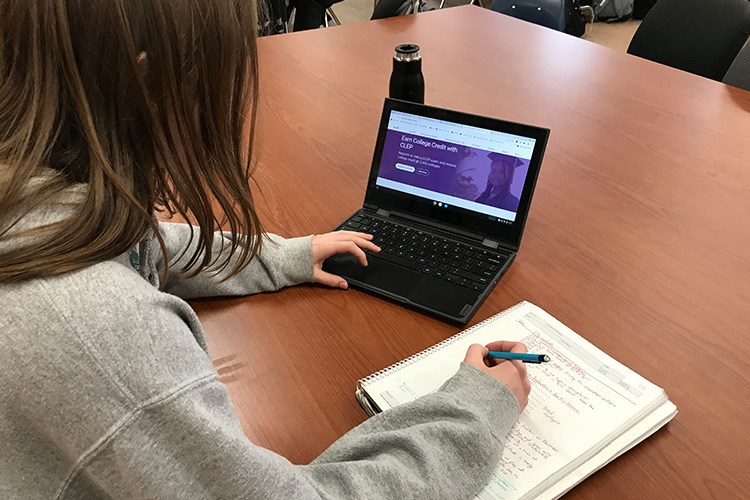
A student studies for an AP test independently. photo by Roxanne Wilkerson
Independent college studies prepare students for college.
With colleges getting more and more competitive every year, Advanced Placement (AP) exams and extracurriculars are a must for a college resume. For students who are looking for an additional challenge or are not satisfied with the AP offerings at their school, self-paced learning offers an opportunity for students to learn on their own. A high school student or an adult returning to school to learn college course material individually through the College-Level Examination Program (CLEP) exams or an AP exam. For self-paced AP exams, students need to opt for the test only option, forfeiting College Board’s resources traditionally offered, making CLEP an easier tool to gain college credit individually compared to AP.
Both CLEP and AP exams allow students to earn college credit and place out of introductory college courses if their exam is passed. The main difference between CLEP exams and AP exams is that CLEP exams are prepared by students independently and the credits are put towards two and four year colleges. On the other hand, AP exams are traditionally taught in classrooms, and the credits help with college admissions and understanding of college level skills. For this reason, CLEP exams are the easiest resource to earn college credits independently.
Typically, students who choose to take AP exams are high school students and homeschooled or independent study students. Those who take CLEP exams are usually adults returning to school, military service members, college students, homeschooled and high school students, international students, master’s degree program applicants, and professionals.
To prepare for CLEP exams, scholars must study through third party sites because CLEP does not endorse any study materials. For example, Modern States is a credible resource to study for CLEP because it is a free non-profit with online tutoring and recorded videos from professors specializing in certain topics. Students must be cautious when looking for credible resources, as to not get scammed. According to College Board, the following are warning signs from a study resource: an attempt to sell preparation services for many CLEP exams at once, with sizable payment up front or on credit, credit agreements with a company other than the one selling the preparation materials, salespeople contacting family members at home, a promise of college credit without enrolling in college, or an attempt to sell dictionaries or encyclopedias as part of the test preparation packages.
Once the CLEP course is completed, students can test any time of the year. Most schools typically provide tests near the end of the year, but students may choose to test remotely with a 30 dollar remote testing upcharge in addition to the exam fee, which is 84 dollars. The College Board only offers 34 exams through CLEP, while AP offers 38. CLEP offers mainly multiple choice questions, with a few college composition sections or essays. The difference in scoring between AP and CLEP is that AP scores on a 1-5 scale, five being the highest score similar to an A in college, a four is similar to a B in college, etc. CLEP is scored on a scale from 20-80, where 55-60 is about 70%, and will earn students college credit in most colleges.
CLEP exams not only earn students college credit, but also offer the opportunity for students to learn new material outside of a classroom environment. According to IvyWise, a New York-based firm of educational consultants, “For high school students, self-studying can help improve transcripts.” Although there is a higher level of difficulty in self-studying, it does a good job preparing scholars for independence in college. For those who appreciate learning at their own pace, CLEP is the perfect opportunity for students to take initiative for their future. (College Board provides more information on their website).